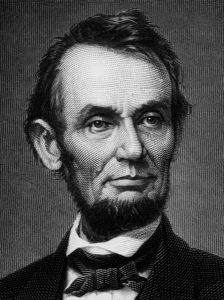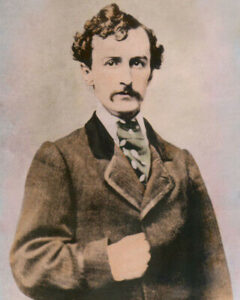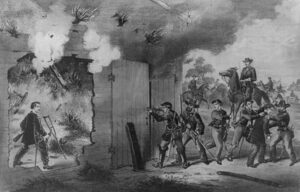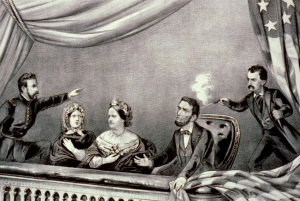
 John Wilkes Booth was an actor, and as such, he had an expectation of applause following a performance. That is just what he thought the assassination of President Lincoln was. No, he didn’t think it was fake. He knew he was murdering the President of the United States, but he somehow thought people would consider it one of his greatest performances…the crowning moment of his stage career. It never occurred to him that the people who had loved him as an actor would suddenly turn against him.
John Wilkes Booth was an actor, and as such, he had an expectation of applause following a performance. That is just what he thought the assassination of President Lincoln was. No, he didn’t think it was fake. He knew he was murdering the President of the United States, but he somehow thought people would consider it one of his greatest performances…the crowning moment of his stage career. It never occurred to him that the people who had loved him as an actor would suddenly turn against him.
At the very least, he expected to be greeted with applause and support by those sympathetic to the Confederacy. Instead, he found, much to his shock and great dismay, that he was a hounded man, and few wanted to associate with him. Oh, the loyalists to the Confederacy did their duty by him, but with great reluctance. He first encountered this reaction when he and David Herold, who was an American pharmacist’s assistant and Wilkes accomplice in the assassination of Abraham Lincoln, stumbled upon a man in the dark, while searching for the home of Colonel Cox. The man, a local named Oswell Swann, reluctantly agreed to guide then to the Cox home, but only if he received payment for his services. He considered it just reward for the risk he was taking. Afterward, Swann collected his fee and vanished into the night, leaving the fugitives to the “hospitality” of Colonel Cox. That “hospitality” consisted of a few supplies, including whiskey, and a servant to lead the men to a hiding place in the woods. Cox certainly didn’t want these men to be found in his house.
Cox informed Booth that he was to “remain hidden in the woods until contacted.” Then Cox sent for Thomas Jones, a Confederate agent with experience in smuggling spies and information across the Potomac River into Virginia. Jones agreed to get them out and guide them across the Potomac, for a fee, but when he visited the fugitives in the woods, where they hid in a pine thicket, he told them it would be several days before he could do so. The manhunt for Booth and Herold was massive. Federal troops combed the area, searching properties and interrogating citizens over whether they had seen two men traveling together. Booth was very distressed, because instead of receiving the expected support and appreciation of the south, Booth found himself confined to a pine thicket!! Jones provided the men with newspapers, from which Booth discovered that he was widely considered a villainous murderer, rather than the Confederate hero he had expected to be. He wrote about his “horrible” fate, and the “injustice” of it all, in a diary he kept in an appointment book.
Federal authorities had most of the conspirators who had planned to kidnap Abraham Lincoln in custody by April 20, 1865. Several were not party to the assassination, but because they were involved in the kidnapping plans, they were held anyway. Three men were still not in custody…Booth, Herold, and John Surratt remained at large. The War Department put out wanted poster, released in Washington on April 20, offering a $50,000 reward for Booth, and $25,000 apiece for Herold and Surratt. By then, Surratt was hiding out in Canada, even though he knew that his mother was being held in federal custody. Coward that he was, Surratt was making plans to flee to Europe. Booth and Herold continued to cower in a pine thicket, relatively helpless. They didn’t dare leave, because they would be seen and immediately arrested. A dejected Booth spent his time drinking whiskey and scribbling in his makeshift diary over the unfairness of his reception. He believed his action had made him a martyr to the Confederate cause.
When the fugitives finally attempted to cross the Potomac, on about April 21, Jones’s guidance consisted of verbal instructions directing them to a waiting boat. These men had no boating experience, and the night was windy. The tides and swift current didn’t help matters either. Nor did the gunboats in the area. Booth whined into his diary, “last night being chased by gunboats till I was forced to return wet, cold, and starving.” Needless to say, the crossing was a failure, but Booth’s overly dramatic entry exaggerated what may have been an encounter with USS Juniper, positioned in the river near their point of crossing. Juniper’s log did not include a report of chasing anything that night. Booth likely spotted the gunboat, and in a panic, returned to the Maryland shore. Booth’s fugitive days ended when he was caught on April 26, 1865, near Port Royal, Virginia. As Booth and his co-conspirator, David Herold, cowered inside a barn, the soldiers demanded that they surrender. John Wilkes Booth died in agonizing fashion at the hands of Union soldiers in Port Royal, Virginia, 
 two weeks after he assassinated Abraham Lincoln. When the Union soldiers demanded their surrender, Herold complied. But Booth refused. He didn’t leave the barn until one of the soldiers set it on fire. As he tried to sneak out in the shadows and flame, a shot cracked through the silent night…and found its mark. Booth briefly held on to life, but in the end, the bullet would be his demise…in true disgraced style.
two weeks after he assassinated Abraham Lincoln. When the Union soldiers demanded their surrender, Herold complied. But Booth refused. He didn’t leave the barn until one of the soldiers set it on fire. As he tried to sneak out in the shadows and flame, a shot cracked through the silent night…and found its mark. Booth briefly held on to life, but in the end, the bullet would be his demise…in true disgraced style.


Leave a Reply